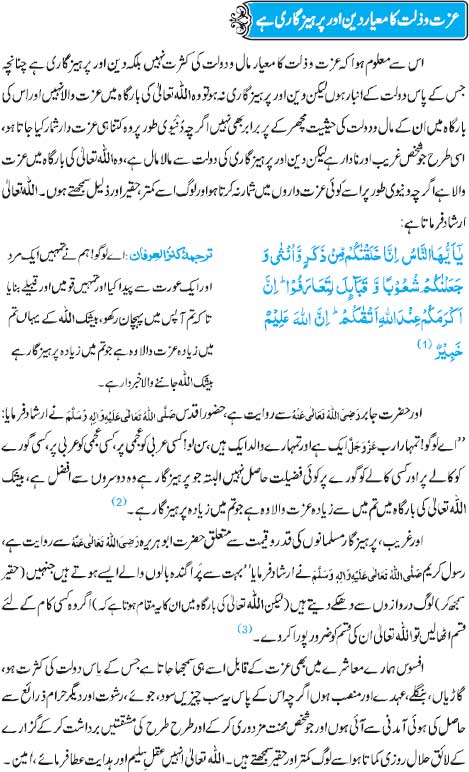
The Vessels and Cups of the People Of Paradise
The vessels from which the people of Paradise will eat and drink will be of gold and silver. Allah (SWT) says:
“Trays of gold and cups will be passed round them..” [43:71] i.e. cups of gold.
And Allah (SWT) says, “And amongst them, will be passed round vessels of silver and cups of crystal, crystal-clear, made of silver. They will determine the measure thereof according to their wishes.” [76:15] i.e it will combine the purity of crystal with the whiteness of silver.
al-Bukhaari and Muslim reported from Abu Musaa al-Ash’ari that the Messenger of Allah (saw) said, “The believer in Paradise will have a tent made of a hollowed-out pearl.. and two gardens of silver, their vessels and everything in them, and two gardens of gold, their vessels and everything in them.” [Mishkaat al-Masaabeeh, 3/86]
Among the vessels from which they will drink will be cups and jugs and glasses:
“They will be served by immortal boys, with cups, and jugs and a glass from the flowing wine.” [56:17-18]
The “cup” [koob] is something that has no handle or spout, the “jug” [ibreeq] has a handle and a spout and the “glass” [kaa’s] is a cup that is filled with drink.
- April, 6
- 1862
- Paradise-Hell
- More
Surah Kausar

Woman’s Right To Khula
ISLAMIC Shariah provides for Nikah in order to keep the society morally healthy, bring to an end all that is evil and obscene, and let husband and wife live in peace and harmony. If a couple fails to reap these benefits from a Nikah-based wedlock, viz. the matrimonial relations do not remain pleasant and harmonious and in case that situation prevails, there arises the danger of spoiling the very purpose of Nikah, then it is desirable to annul such a Nikah.
Since it is binding upon the husband to pay Mahr to his wife and provide all the basic needs to her, he has the right to pronounce the divorce. If a woman wants separation from her husband, she will have to return her Mahr. In Islamic parlance, this right of a woman is called Khula. Khula means to annul, to free, to rescind. Precisely, it is a typical form of breaking the marriage bond. Scholars of Islamic jurisprudence have defined it differently and at great length. The gist of all this is that a man’s pronouncing divorce after receiving money for the purpose from his wife is called Khula.
The right to divorce rests with the husband. If the wife wants to seek divorce, the way is open for her on the condition of returning her Mahr. If the husband is not ready to divorce her even on the condition of getting the Mahr back, the woman can move the court and the court, in turn, would secure divorce from her husband in lieu of the Mahr.
During the lifetime of Prophet Muhammad (peace be upon him), there arose some cases of Khula which led the Islamic State of Madina to lay down its rules and procedure. The Holy Qur’an says “…Then if you fear that they would not be able to keep the limits ordained by Allah, then there is no sin on either of them if she gives back (the Mahr or a part of it) for her Al-Khul (divorce). These are the limits ordained by Allah, so do not transgresses the limits ordained by Allah, then such are the Zalimun (wrong-doers).” (Qur’an, 2:229)
As divorce without any rhyme or reason is most detrimental, similarly seeking Khula without any solid ground is most detestable in the eyes of Shariah. A tradition of the Noble Prophet (peace be upon him) says: ‘The woman who demands divorce from her husband without having any ground, will be deprived of the fragrance of Heaven.’ (Bukhari)
However, if there is any reasonable ground, securing Khula is permissible and there is no hitch about it. Another Hadith says: “The wife of Thabit Bin Qais went to the Noble Prophet (peace be upon him) and said to him: ‘Messenger of Allah, I dislike Thabit the most. I do not level any charge against his faith or morals, but I fear that living with him may plunge me into Kufr.’ The Noble Prophet (peace be upon him) asked her whether she would return the garden which he (Thabit) had given her as Mahr. To which she replied in the affirmative. Then he (the Prophet) asked Thabit Bin Qais to get the garden back and divorce her.” (Bukhari)
Another case of Khula relating to the same Thabit Bin Qais is reported thus: “Thabit Bin Qais beat his wife Jameelah. She (Jameelah) or, according to another report, her brother complained to the Noble Prophet (peace be upon him) against him. He (the Prophet) sent for Thabit and told him to take the Mahr back and divorce his wife.” (Nasai)
A study of these traditions brings to light certain facts about Khula. One, if a woman dislikes her husband, and as a result fears that the couple might not be able to keep within the bounds set by Allah, opting for Khula is better.
Two, the woman will have to return the Mahr in order to secure divorce. And if the husband does not want to divorce her even on the condition of taking the Mahr back, he will be compelled by the court to accept the money and divorce her. Three, these traditions also indicate that the amount of Mahr should be considered as the maximum for granting Khula. That is, a man should accept the Mahr back from his wife and divorce her on demand. If a man demands more than the amount of Mahr to grant Khula, it is undesirable. However, it is not illegal according to Ibn Abbas, Ibn Umar and Uthman.
The divorce pronounced in the case of Khula, in whatever words it is done, will be final and irrevocable. That is, the man will have no right to revoke the divorce during the woman’s Iddah. Had the man been given the right to revoke the divorce in case of Khula, the very purpose of Khula would not have been served. Khula has been provided for to give the woman the right to separation from her husband if she dislikes him, and for this kind of separation, she returns her Mahr. In spite of this, if a man were to have the right to revoke the divorce, it would mean the woman was not given that right.
Like divorce, Khula also becomes effective without the intervention of the court. It can be demanded and granted in the privacy of the man and wife or in the presence of some relatives and friends. However, if the man is not willing to grant Khula, the case should be referred to a court.
Unlike divorce, Khula can be demanded and granted even while the woman has not completed her menstrual period.
A woman can herself demand Khula or her Wali (guardian) can do so on her behalf. However, if the woman has not attained puberty, her Wali has no right to demand Khula on her behalf.
– Mushtaq A. Tejarwi – an eminent scholar of Fiqh from India.
- April, 3
- 2954
- Human Rights
- More
Tajdar-e-Risalat Ki Shan e Amanat Dari
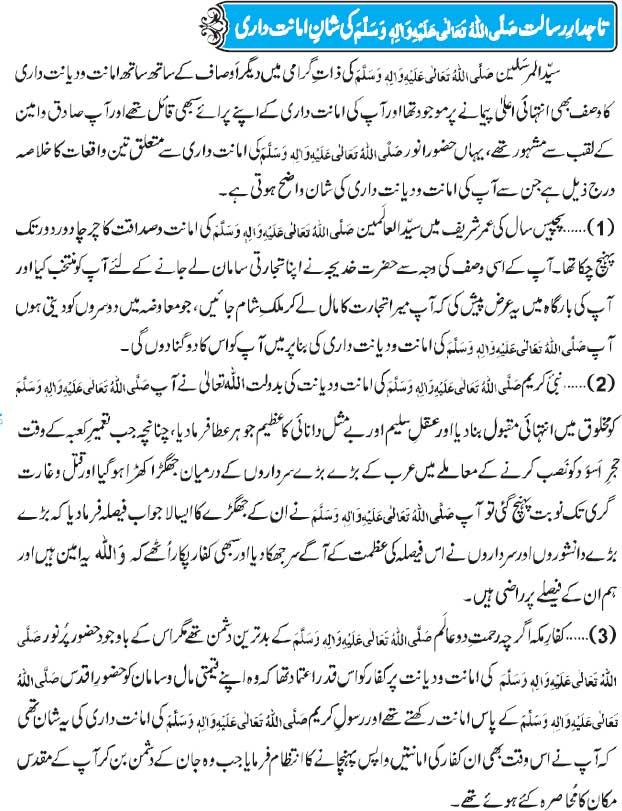
A Message To Those Drowning In Sin
Q: I would like to let you know that I have committed the most major sins and I am not saying this in order to take pride in my sins – I used to feel this before but not any longer. I have defeated Satan in many rounds, but he defeated me in more battles. Is it possible for me to return to Allah once again and how?
A: In the name of Allah, Most Gracious, Most Merciful. All praise be to Allah and prayers and salutations to our Prophet Muhammad and his family and companions.
The Prophet (PBUH) said Allah will forgive whoever repents before the sun rises from the west [reported by Muslim from the Hadith of Abu Hurairah].
Nothing prevents you from repenting, even if your sins reach the sky or fill the whole earth. As long as the human being is in this life, the door of repentance is open. You are in the midst of a battle between the call of faith in your heart, and the call of desire that is guided by Satan in your heart.
The heart is not immunized from Satan except with the Zikr (remembrance) of Allah, the Exalted, and it does not have the strength to want good except by doing good deeds. Satan does not defeat the heart unless it is inattentive of the Zikr of Allah, the Exalted and unless it is weak because of vice and sins committed. Take it and maintain it as its results are guaranteed, Allah willing, if you persevere it honestly:
- Keep up the five prayers in congregation, especially the Fajr prayer and never miss it. Allah, the Exalted says “and the fajr reading of the Qur’an , verily the fajr recitation of Qur’an is witnessed,” i.e. the Fajr prayer is witnessed by angels.
- After the Fajr prayer remain in the mosque to read the Qur’an until sunrise, and then offer two Rakahs (prayer units) 10 minutes after sunrise.
- Say Subhan Allah wa bi Hamdihi (may Allah be glorified and praised) one hundred times a day at any time in the mosque or house, whether walking, sitting, in the car, etc. This Zikr wipes out sins.
- Ask forgiveness of Allah one hundred times each day, saying Astaghfirullah wa atoobu ilayh (I ask forgiveness of Allah and I repent to Him), once again at any time you wish and in whatever condition you are in.
- Say this zikr: la ilaha illa Allahu wahdahu la sharika lah, lahul mulk wa lahul hamd wa howa ala kul shayin qadeer (there is no god but Allah; He has no partner; He is the dominion and praise, and He is capable of everything) one hundred times each day at any time you wish and in whatever condition you are.
- Between Maghrib (sunset prayer) and Isha (evening prayer) remain in the mosque and do not leave it, and recite as much as you can of the Qur’an, with full concentration.
- Continue this program for at least a month: living with the Qur’an, reciting it with consideration, and acting upon what is in it; spending time alone for long hours for the Zikr of Allah, the Exalted.
- If the environment in which you live does not support you in applying this program, then change the environment – abandon bad friends, and avoid places that encourage you to commit sins.
- Donate part of your money as a form of repentance to Allah, the Exalted, as charities given in secret are seen only by Allah, the Exalted.
In an authentic Hadith, “Secret charities extinguish the anger of the Lord.” [Narrated by ibn Hibban from the Hadith of Anas] - Try to perform Umrah with the intention of renewing your faith and cleansing your past with the water of this blessed trip.
11. If you owe anything to others, return that and do not retain anything you will be accounted for, as a form of repentance to Allah.
Mah-e-Shaban Ki Fazeelat
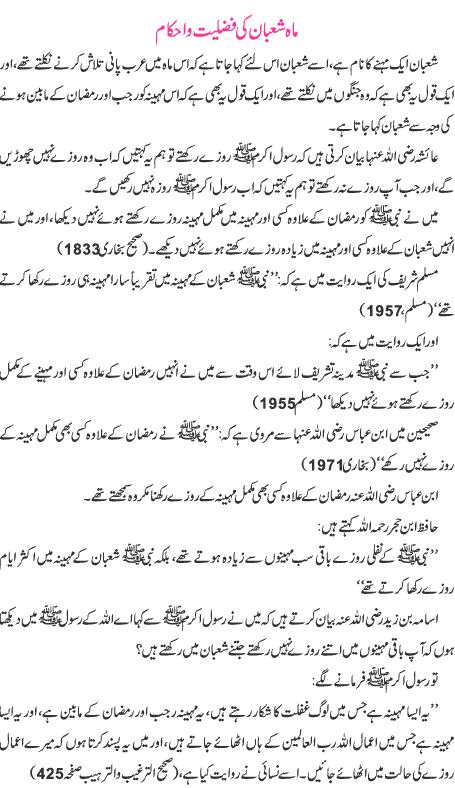
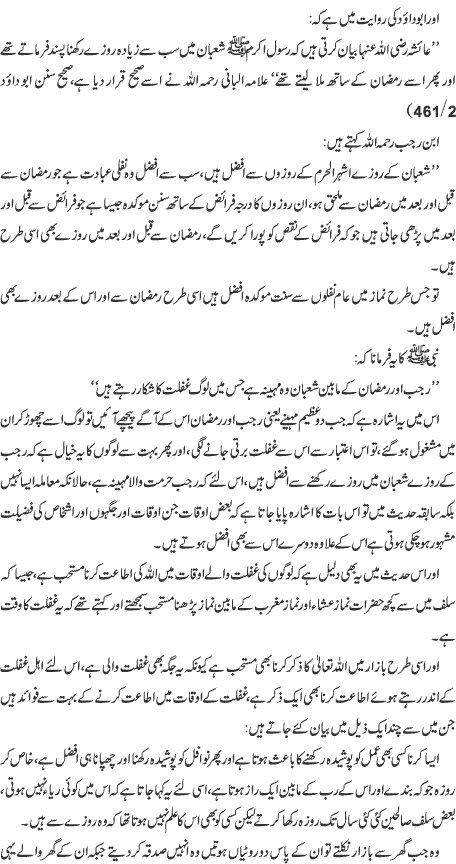
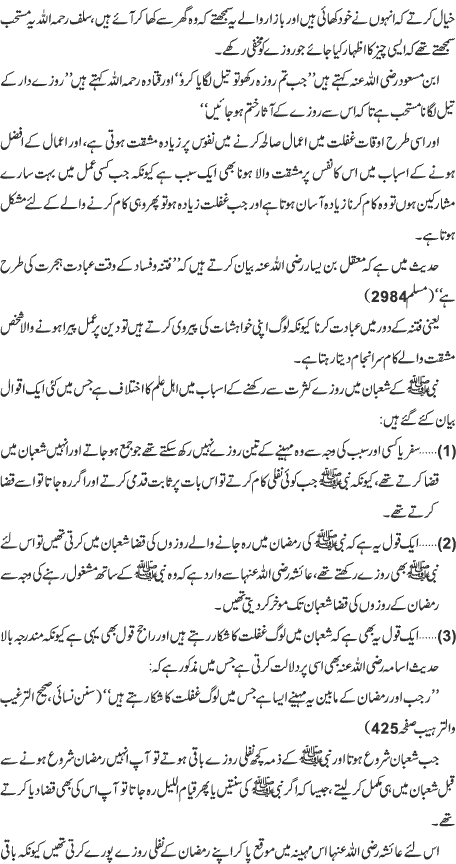
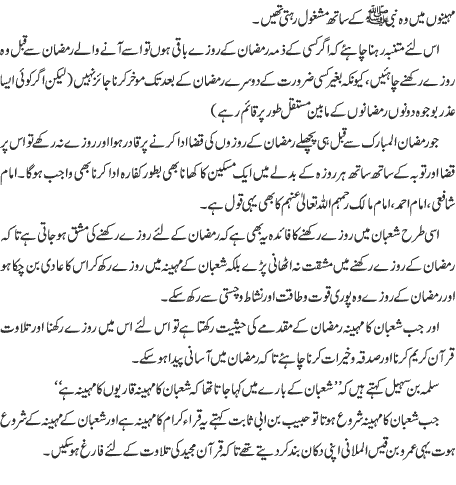
Medical Advantages Of Sajda (Prostration)
Sajda(Prostration) is a unique position or stance in the regular prayers, which a Muslim is supposed to offer at least five times a day. Although the basic purpose of obligatory prayers is not to provide an exercise for people yet it is being increasingly recognized that it has plenty of medical advantages for the human body.
Here it is worth mentioning that Holy Prophet Muhammed (peace be upon him) has mentioned in a hadith in Ibn Maja:’That prayer is a cure for many diseases’. The position of Sajda in which the forehead touches the ground is exclusively associated with the Muslim form of prayer. It is the climax of a Muslim’s prayer and as mentioned in a Hadith a Muslim is nearest to Allah in this position.
The messenger of Allah (pbuh) said: “The nearest a servant comes to his Lord is when he is prostrating himself, so make supplication’ (in this state)” In a Hadith narrated by Anas bin Malik (R.A.) Holy Prophet (peace be upon him) advised Muslims to perform Rukuu (bowing) and Sajda(prostration) properly.
In another Hadith he (peace be upon him) advised to perform Sajda(Prostration) and Bowing calmly and to get up only when the body has come to ease. Hence the first positive effect upon a person who prostrates or does Sajda(Prostration) is that he comes nearest to Allah and hence in that condition he can supplicate.
Psychological advantage:
This is a great psychological advantage and it gives relief to the person concerned as life is full of worries and in this position he gets at least a transient refuge from the agonizing problems.
When a person goes to the position of Sajda(Prostration), his whole body is in active motion. This position can be considered as a mini dive as the musalli (one who offers prayer) goes to rest his forehead on the ground while his hands are placed at the sides. This brings most of the body muscles if not all in active motion and serves to give them some exercise. The hands are then specifically stretched out and thence the forearm as well as arm muscles are supposed to bear the weight in the Sajda(Prostration) position. It gives good exercise to the muscles of the upper limb. The Prophet (peace be upon him) in a hadith advised not to put the forearms flatly on the ground but to keep them elevated above the ground and this is better for the forearm and arm muscles.
Sajda(Prostration) is a unique position as this is the only position in which brain (or head) becomes lower than the heart and hence for the first time, the blood gushes towards the brain with full force whereas in all other positions (even when lying) brain is above the heart when it has to work against gravity to send blood to the brain. In the position of Sajda(Prostration) due to the increased blood supply, the brain receives more nourishment and it has a good effect upon memory, vision, hearing, concentration, psyche and all other cognitive abilities.
People who offer their prayers regularly have more will power and can cope with the difficulties of life in a much better manner.
They have less incidence of headaches, psychological problems and other defects of cognitive function. In the unique position of Sajda(Prostration) the neck muscles get the best exercise. They have to bear the load when the forehead lies at the ground hence the neck muscles become stronger. One can note the tense pressure at the neck muscles in the position of Sajda(Prostration) especially the active motion of the neck and the facial muscles when the head is being lifted. (e.g. one inch above the ground) and it will be noticed that they are in a very active motion.
More strong cervical muscles mean the cervical vertebra will be better protected. The strength of cervical muscles is important as the headrests upon cervical vertebra supported by cervical musculature. In fact, head performs rotator movements over the cervical vertebra. In any accident cervical neck examination is especially important to the physicians because of its extraordinary importance. It is uncommon that a person who offers his prayers regularly will get the usual neck myalgias or cervical spondylosis as the neck muscles particularly become very strong due to the 34 sajdas(Prostrations) offered daily in five prayers.
The unique position of Sajda(Prostration) also has positive effects upon the back muscles as while going into Sajda and getting up from it the back muscle contract actively and they become stronger. Probably it is because of this reason that a person who is regular in prayers will (rarely) get backache.
Finally, it must be reminded that (even though) prayer is not meant to be an exercise, there are a lot of medical advantages associated with it. Still, the best blessing is the peace of mind, which a person derives by the accomplishment of his duty to Allah by fulfilling an obligation.
Dr. Muhammad Karim Beebani, Saudi Gazette
Qayamat Kay Din Parhizgar Musalman Ki Dosti kaam Aayegi
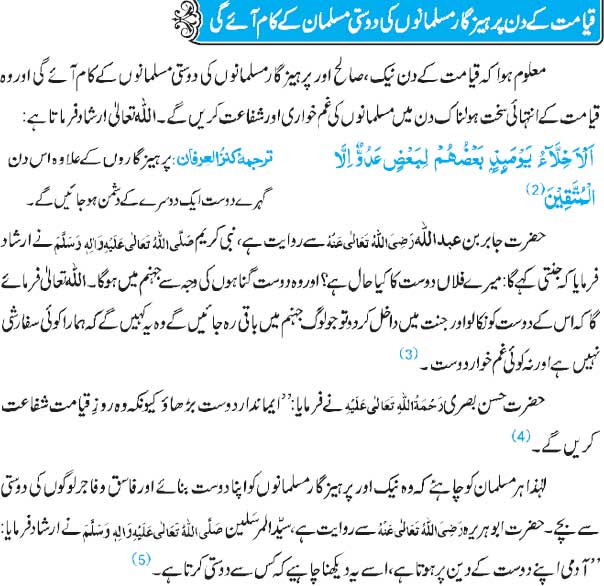
How Prayer Accelerates Treatment Of The Sick
And Your Lord said: “Invoke Me, I will respond to your (invocation). Verily, those who scorn My worship, they will surely enter Hell in humiliation!” (Ghafir 40:60)
According to the Qur’an, prayer, meaning “calling, requesting, seeking help,” is a person’s turning sincerely to Allah, and seeking help from Him, the Almighty, the Compassionate and Merciful, in the knowledge that he is a dependent being. Illness is one of those instances when a person feels this dependence most and draws closer to Allah. Furthermore, sickness is a test, devised in His wisdom, that takes place by His will, and is a warning to remind people of the transience and imperfection of this life, and is also a source of recompense in the hereafter for the patient and submissive.
Those without faith, on the other hand, imagine that the way to recovery is through doctors, medicines or the advanced technological capabilities of modern science. They never pause to think that it is Allah Who causes their physical systems to function when they are in good health, or Who creates the healing medicines and doctors when they are ill. Many turn only to Allah when they arrive at the opinion that doctors and medicines are inadequate. People in such situations seek help only from Allah, realizing that only He can free them from their difficulty. Allah has revealed this mindset in a verse:
And when harm touches man, he invokes Us, lying on his side, or sitting down or standing. But when We removed his harm from him he passes on as if he had never invoked Us for a harm that touched him! Thus it is made fair-seeming to be Musrifun that which they used to do. (Yunus 10:12)
The fact is, however, that even in good health, or without tribulations or other difficulties, a person must pray and give thanks to Allah for the comforts, good health and all the other blessings He has imparted.
One very important aspect of prayer is this: In addition to praying out loud, it is also important for a person to make every effort to pray through his or her deeds. Prayer by action means doing everything possible to attain a certain wish. For example, in addition to praying, a sick person may also have to visit an expert doctor, use medicines that will be of benefit, and receive hospital treatment if necessary or some other form of special care. Because Allah has linked everything that happens in this world to specific causes, everything in the world and in the universe happens in accordance with these causes. Therefore, the individual must take the requisite measures in accordance with these causes, and yet await the outcome from Allah, with humility, submission, and patience, in the knowledge that it is He Who brings about their results.
The positive effect of faith and prayer on the sick and the way this accelerates treatment is a matter that has attracted the attention of and is recommended by doctors. Under the heading “God and Health: Is Religion Good Medicine? Why Science Is Starting to Believe,” Newsweek took the curative effect of religion as its cover story. It reported that faith in God raised people’s morale and helped them recover more easily, and that science had also begun to believe that people with religious faith recover more easily and quickly. According to a Newsweek survey, 72 percent of Americans say they believe that praying can cure someone and that prayer facilitates recovery. Research in Great Britain and the USA has also concluded that prayer reduces patients’ symptoms and accelerates the recovery process.
According to research conducted at Michigan University, depression and stress are observed to a lesser extent in the devout. And, according to findings at Rush University in Chicago, the early death rate among people who worship and pray regularly is some 25 percent lower than in those with no religious convictions. Another study conducted on 750 people, who underwent angio-cardiography, proved scientifically the “curative power of prayer.” It was established that the death rate among heart patients who prayed decreased by 30 percent within a year after their operations.
Examples of the prayers mentioned in the Qur’an are these:
And (remember) Ayyub (Job), when he cried to his Lord: “Verily, distress has seized me, and You are the Most Merciful of the merciful of all those who show mercy.” (Al-Anbiya’ 21:83)
And (remember) Zakariya (Zachariah), when he cried to his Lord: ” O My Lord! Leave me not single (childless), though You are the Best of Inheritors.” (Al-Anbiya’ 21:89)
And indeed Nuh (Noah) invoked Us, and We are the Best of those who answer (the request). (As-Saffat 37:75)
As has already been stated, prayer must not only be for alleviation of sickness or other mundane problems. A sincere believer must always pray to Allah and accept whatever comes from Him. The fact that the benefits of prayer revealed in many verses of the Qur’an are now being recognized scientifically once again reveals the miraculous nature of the Qur’an.
And when My slaves ask you (O Muhammad, peace be upon him) concerning Me, then (answer them) I am indeed near (to them by my knowledge). I respond to the invocations of the supplicant when he calls on Me. So let them obey Me and believe in Me, so that they may be led aright. (Al-Baqarah 2:186)

